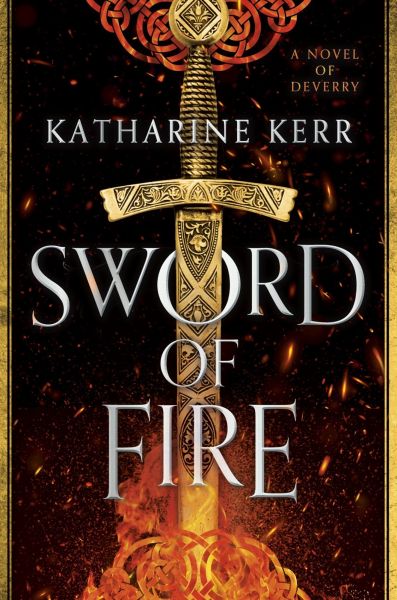Nice Sharp Quillets
Sword of Fire (Justice War, volume 1)
By Katharine Kerr

3 Jan, 2023
0 comments
2020’s Sword of Fire is the first volume in Katharine Kerr’s Justice War series. Justice War is the fifth series set in Kerr’s Deverry secondary-universe fantasy setting.
Centuries after the events of the Deverry, Westlands, Dragon Mage, and Silver Wyrm arcs, Aberwyn’s ruler, the Gwerbret Ladoic, faces a most unwanted development: widespread cries for a rule of law that is based on something more than a Gwerbret’s whim.
When Cradoc the Bard launches a hunger strike to protest the lack of reform, Ladoic ignores the Bard. Surely, Cradoc will give in before Ladoic does. Cradoc does not. Cradoc starves himself to death. Ladoic’s political problems are now much worse.
A keystone of Ladoic’s stance is that by ruling as they do, he and the rest of the aristocracy are simply following tradition. Reforming the courts to be more responsive to the lower classes would be a radical development. If Aberwyn is to be preserved, such extreme change must be rejected.
Inconveniently for the Gwerbret, Ladoic’s daughter Dovina and her close friend Alyssa favour reform. Worse, they attend the United Scholars’ Collegia. The Collegia’s resources include a trove of historical documents, some quite old. The ancient records deliver a treasure: evidence that ages ago, the rulers of the lands were responsive to public will.
Ladoic quickly seizes on the fact the Collegia’s copy of the document is just that, a copy. Perhaps it is a poor copy and the original says something very different. Perhaps the document is a forgery. Prudence or at least entrenched self-interest suggests he ignore it.
Were this not sufficient, Ladoic withdraws Dovina from the Collegia. The time has come for his daughter to play her designated role, which is betrothal to a suitor of elevated blood. While this is not an entirely untoward development — Dovina’s intended Merryc so values knowledge he demanded an educated wife — withdrawal from the Collegia will hamper, if not preclude, any further research on Dovina’s part.
But Alyssa fails to take the hint and continues her search for the original document. In so doing, she overlooks a regrettable fact about the legal system in which she lives: a vexed Gwerbret can very easily find a legal pretext to deal with unruly commoners. In short order, Alyssa and her mercenary protector Cavan are the targets of a manhunt.
~oOo~
This novel had terrible timing: it was released just before Covid-19 took over our lives. This reminded me of the sad case of an author (someone I know) whose amiable science-fantasy novel was released just before 9/111.
Alyssa and Dovina’s quest to establish rule of law is enormously aided by the fact that Deverry already has rule of law in rudimentary form. Yes, royal decree plays a significant role, but there is an established custom of justifying decrees by appealing to documented tradition. The region isn’t just a collection of autocratic well-armed oligarchs.
Also, Ladoic isn’t a villain, as such2. He’s a powerful man unaccustomed to the word “no,” as well as a steadfast traditionalist whose dedication to tradition is no doubt greatly aided by the fact he thinks tradition is on his side. However, he’s not all bad: out-think him charmingly enough and he might find it an amusing jape.
Ladoic is keenly protective of his personal honour, something he shares with other aristocrats. Astonishingly, this does not translate into stability. There is a subplot (no doubt to be developed more in later volumes) that is driven by the fact that compromise might besmirch honour3. Better to die violently than to give ground. As a result, there are fewer well-born characters at the end of the novel than there were at the start.
Sword of Fire adheres to fantasy conventions of the 1970s and 1980s, which is to say that while the volume is part of a series, it also stands on its own as a novel. I think many of us prefer this to the other model, wherein each thick book is merely an in media res fragment of a larger work that may never be finished. Sword of Fire’s model is much to be preferred.
There are some very bad people in this book, but they’re antagonists and complications, not central figures like Alyssa and Dovina (and their love interests). Sword of Fire is surprisingly amiable for a novel with as many deaths as it features. It’s also a much faster read than the page count would suggest.
Sword of Fire is available here (Amazon US), here (Amazon Canada), here (Amazon UK), here (Barnes & Noble), here (Book Depository), and here (Chapters-Indigo).
1: Sometimes authors find ways to make soup from stones: Christopher Brookmyre explained why protagonist Angelique de Xavia did not receive more accolades for confounding the terrorist plot in A Big Boy Did It and Ran Away by pointing out in its sequel that she did so on September 10, 2001 and other news almost immediately bumped her from the headlines.
2: Arguably, Ladoic cannot be an utter villain if the author is to tell the story she wants to tell. If Ladoic were an Ivan-the-Terrible-style ruler, he’d either murder everyone arguing for reform or else internal friction would develop into outright civil war.
3: Ladoic may not be literate but he’s no dummy. Alas, a number of his fellow aristocrats are quite dim.
